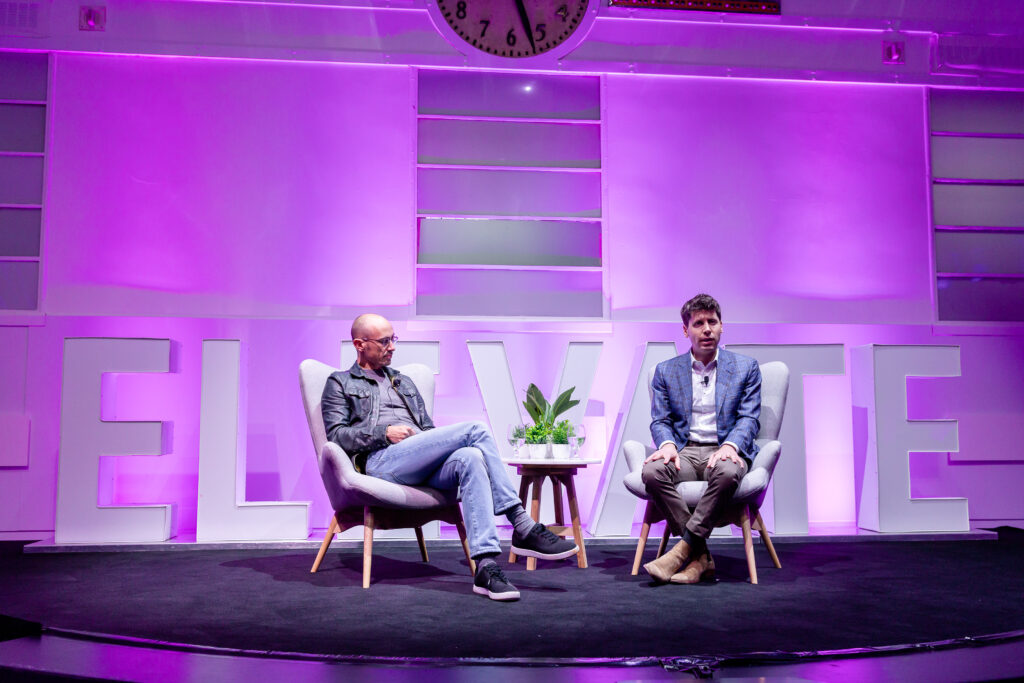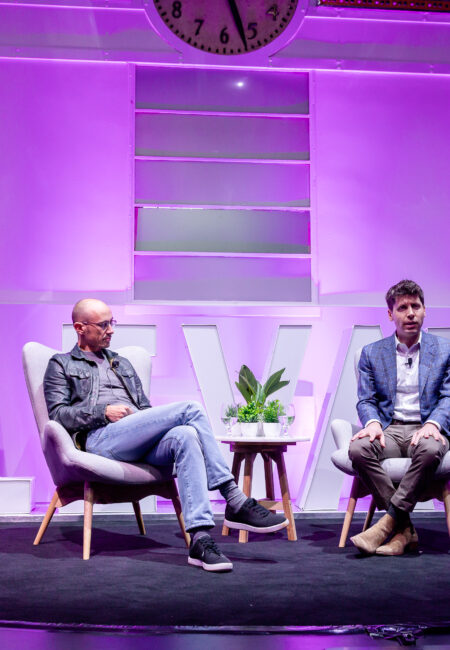By: Stephanie Porfiris, May 16 2023
If you type “ChatGPT” into Google, 831 million results instantly appear. A search for “OpenAI” yields nearly five billion. With so much information accompanying the surge of popularity of these tools – everyone from BuzzFeed to Bloomberg is talking about them – developing an understanding of just what it all means can feel like a massive undertaking. And with an undercurrent of anxiety surrounding the implications of this novel technology quietly bubbling in the subtext of each new article, the entire situation is beginning to appear increasingly daunting and opaque.
On May 15, Elevate hosted an invite-only event featuring Sam Altman and Tobias Lütke. Altman is at the helm of OpenAI, the company that developed ChatGPT. Lütke founded Shopify, a leading ecommerce platform. The CEOs sat down with policy-makers, start-up executives, and industry leaders to discuss the past, present, and future of these revolutionary technologies, and to explore their impact on the way we interact with ourselves, each other, and the world around us.
Before exploring the key takeaways from their chat, let’s establish a foundational understanding of the technology at the heart of the event, beginning with the million-dollar question…
What is ChatGPT?
Released in November 2022, ChatGPT is a natural-language processing (NLP) platform that enables users to engage in informal, organic conversations with a responsive (seemingly omniscient) chatbot. According to OpenAI, ChatGPT pulls its information from data it scrapes from the web, privately licensed data, as well as the data provided by its users. To date, over 1.6 billion people around the world have interacted with ChatGPT.
Upon first glance, ChatGPT may appear indistinguishable from hundreds of other chatbots available online, but after interacting with the little green bot for a mere few minutes, the sheer power of the platform becomes increasingly apparent. The closest thing in existence to a digital genie, ChatGPT can instantly generate anything from a personalized résumé and accompanying cover letter to a step-by-step explanation of even the most complex of topics. But its skillset is not limited to only the professional realm. Some individuals are using the platform to develop diet plans and exercise regimens. Others have enlisted ChatGPT as a virtual therapist. In short, the opportunities provided by this revolutionary platform are seemingly infinite.
However, as many thought leaders have begun to point out, the accompanying concern generated by the technology is equally expansive. Like all technology platforms trained on private data, there are serious concerns surrounding ChatGPT’s privacy procedures. The platform fell victim to a data breach in March 2023, and although the company addressed the source of that particular weak spot, scrutiny was nevertheless kicked into overdrive. Additionally, AI innovators are becoming increasingly vocal about the risks associated with under-regulated AI creation and propagation; with its gargantuan user base and formidable computing power, ChatGPT is often mentioned in those high-stakes conversations.
It goes without saying that ChatGPT, and AI in general, are top of mind for thought leaders around the world. This is what two of the most prominent minds had to say about the upcoming revolution.

#1. ChatGPT is a tool, not a creature.
OpenAI has opted to use a simple flower-like icon – not a face with a nose, mouth, and eyes – as ChatGPT’s avatar. Unlike other peer platforms, the chatbot also lacks an endearing human name – you’re not talking to Ada or Candy; you are engaging with ChatGPT. These decisions all serve to mitigate users’ tendency to anthropomorphize AI. Don’t let the chat format and friendly tone of the conversation fool you; this is a tool, not a creature.
Mistreating the technology as an omnipotent being inevitably makes people fear for their careers. Despite the current frenzy surrounding AI-induced job redundancy, Lütke eased audience concerns that AI is going to put them out of work, stating “AI replaces tasks, not jobs”.
Instead of harming the professional domain, AI is positioned to help it flourish. According to Sam Altman, ChatGPT is a “fundamentally equalizing technology”. Small children can use it. Old people can use it. A person with a $20 smartphone can use it. AI has the potential to not only minimize systemic barriers to success but also allows for a never-before-seen degree of productivity and efficiency. Gone are the days of being bogged down by distracting, meaningless tasks; as Tobias Lütke stated, “Everyone will be the CEO of the work they want to do”.
#2. Regulation is critical.
With great power does indeed come great responsibility, and AI is proving to be one of the most powerful phenomena humankind has ever encountered.
Sam Altman proposed a global regulatory framework for the direction and management of the world’s largest AI players, including his own company. Considering the exponential speed at which these technologies are emerging, it is becoming increasingly critical to establish universally accepted guidelines. Like other technologies and environments that pose distinct potential threats to the well-being of mankind, AI requires regulation and oversight.
According to Altman, ChatGPT was created because “[he] was concerned about the downsides…if we get this wrong, it would be really, really bad.”
He added that the ubiquitous nature of the technology should endow everyone with a sense of stewardship: artificial general intelligence is going to so intensely impact the world and everyone around it that “we all deserve to govern it”.
#3. We are living through a revolution.
Despite collectively standing at the precipice of an exciting new future, Sam Altman believes there still exists a large excitement deficit. Perhaps we are distracted by fear-mongering or simply lack an understanding of the true capabilities of these new technologies. Regardless of the source, we have lost our collective sense of optimism.
While worrying about unknowns is fundamentally encoded in our nature, and the future seems increasingly high-stakes and zero-sum, Lütke and Altman believe that these revolutionary emerging technologies will create abundance; the pie is about to get a lot bigger, and there will be more than enough slices to go around.
Altman likened the period we are currently living through to the Cambrian Explosion; our lives may change in ways we cannot yet foresee. And while a healthy dose of concern is to be expected, we must also entertain the possibility of things working out in our favour. In short, get excited.
AI is becoming an increasingly omnipresent force in our lives. The only way to harness it is to understand it. From disease detection and deep fakes to driverless cars and ChatGPT, find out about the future of AI from the thought leaders who will be speaking on our AI Content Track at Elevate Festival 2023, running September 26-28. Act fast and get up to 45% off with the Super Early Bird.


